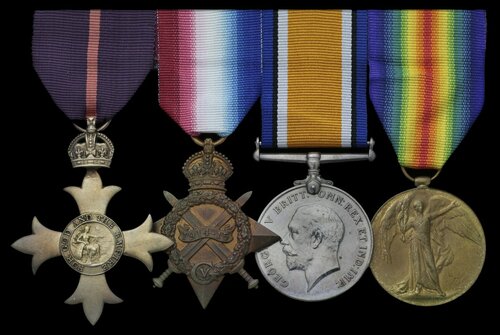
Auction: 22001 - Orders, Decorations and Medals
Lot: 525
The 'Wireless Pioneer's' Great War O.B.E. group of four awarded to Major B. Binyon, Royal Air Force late Royal Naval Air Service, who designed one of the first wireless radio sets for use in aircraft, served as an observer in the Second World War and afterwards became one of the original directors of the British Broadcasting Company, later the BBC
The Most Excellent Order of the British Empire, 1st type breast Badge, Military Division, hallmarked for London 1918; 1914-15 Star (Flt. Lt. B. Binyon. R.N.A.S.); British War Medal 1914-20 (Asst. Sq. Cr. B. Binyon. R.N.A.S.); Victory Medal 1914-1919 (Flt. Cr. B. Binyon. R.N.A.S.), attempted erasure of rank on third, overall contact wear and edge bruising, very fine (4)
O.B.E. London Gazette 7 June 1918.
Basil Binyon was born at Ipswich on 23 April 1885, the son of Brightwen Binyon, an Architect and Painter. Educated at the two Quaker Schools, Bootham School and Leighton Park he later went on to Trinity College, Cambridge studying Natural sciences. While here Binyon indulged his passion for rowing, joining the College Boat as an undergraduate. Graduating in 1907 he began working at the Cambridge Scientific Instrument Company before being offered a job with Marconi Wireless in 1909. With his focus narrowing more to the technology which would become his passion, Binyon took a job as a research engineer at C.I.E. Generale Radiotelegraphique, Paris in 1911. Perhaps playing on this role he then took a position as General Manager of the Anglo-French Wireless Company which he held until 1914.
Commissioned Lieutenant with the Royal Naval Volunteer Reserve on 22 September 1914 he was posted to H.M.S. Pembroke additional for the R.N.A.S. Stationed at Eastchurch he made use of his knowledge of wireless technology to further the war effort, designing a new wireless in October 1914. This was produced by the Sterling Telephone Company and two sets were sent with H.M.S. Ark Royal to the Dardanelles to aid in communication with their aircraft. This proved largely unsuccessful however as the aircrew didn't have the expertise required to man the sets properly.
Promoted Flight Lieutenant on 12 March 1915 at Eastchurch he served as the first aeroplane observer to test gun range. Working in concert with H.M.S. Revenge, an aging battleship in April 1915 Binyon was able to accurately co-ordinate with the Captain of the ship despite not having any prior experience as a gun spotter. The success of the test caused some excitement amongst the Admiralty and further tests were conducted throughout the year. Travelling to France in February 1916, Binyon worked in concert with the French to combine their research in the field of communications. On returning to England he joined the shift from Eastchurch to Cranwell in May 1916, which he did as commander of the Wireless Telegraphy School. Promoted Flight Commander on 14 November 1916 and swiftly on to Flight Commander on 31 December Binyon qualified as a Pilot on 14 April 1917 at Cranwell. Just prior to the award of the O.B.E. Binyon was promoted a third and final time to Acting Squadron Commander a rank he continued to hold until 1 April 1918 when the R.N.A.S. and R.F.C. were amalgamated. After the war he remained at Cranwell as a member of the Wireless Experimental Establishment until transfer to the unemployed list on 21 March 1919.
Completing his M.A. at Cambridge University Binyon went on to form the Radio Communication Company in Barnes. Having been bought out by his former employer Marconi he joined their Board of Directors remaining there until 1922. In that year a meeting of wireless manufacturers made the decision that a single company would be the best way to approach the new medium of radio broadcasting. This decision led to the formation of the BBC, with Binyon as one of its directors, suggesting that he was involved in the attempts at broadcasting made by Marconi earlier that year. Remaining on the board for some time he became chairman of the Institution of Electrical Engineers in 1925 before resigning from the BBC in 1926. This following a disagreement with Lord Reith regarding change from the British Broadcasting Company to the modern British Broadcasting Corporation. Binyon was not quite done with wireless however, returning to work for Marconi until 1935, although in that time he also took on periodical work supervising the Buenos Aires Water Company.
Prior to the Second World War Binyon had joined the Observer Corps. On the outbreak of war he was made Group Commandant of No. 19 Group, Royal Observer Corps with the rank of Observer Commander. He was further honoured in the 1941 Birthday Honours with a commendation, remaining in his role after the war he finally left the military in 1947. Binyon died on 4 April 1977, at Farnborough Kent. His son Roger served with the Royal Air Force during the Second World War and was killed attacking a German armoured column over Sonnenberg; sold together with a large archive of copied research including, census date, a typed biographical summary and a copy of the Cross & Cockade Journal as well as copied and original photographs, service records and extracts from related articles along with London Gazette entries, obituaries and military lists.
Subject to 20% VAT on Buyer’s Premium. For more information please view Terms and Conditions for Buyers.
Sold for
£480
Starting price
£230




